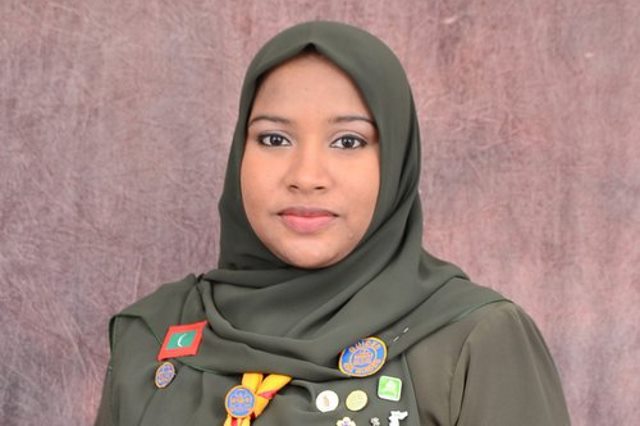On Youth and Future Generations Day at COP21, Aishath Thoifa, a WAGGGS Youth Delegate from the Republic of Maldives, writes about the need to respect future generations' voices to ensure sustainable development and climate justice for all.
Climate change is global and affects everyone on this earth. It has already placed a great deal of stress and caused irreversible damage to our ecosystems, our lands, and our lives. Different regions experience the impacts of climate change at different scales. While developed countries currently have the means to address many of the climate change issues they face, rural and developing areas have yet to find and develop ways to overcome or adapt to the changes of the climate.
As one of the lowest lying countries in the world – with over 80% of the total land area less than 1m above sea-level – numerous environmental problems come into focus in the Maldives. We are built on coral reefs, one of the most endangered ecosystems in the world, which also act as a barrier against giant waves smashing onto our beaches. However, the rising sea levels, the rising sea temperatures, and also the increasing acidity of the ocean are contributing to the bleaching and death of the corals and are making us increasingly more vulnerable to the rapidly changing climate. For Small Island Developing States (SIDS) like Maldives, increasing amounts of Greenhouse Gas Emissions (GHG emissions) , unpredictable seasons, the increasing flood waves, global warming and climate change as a whole, all pose a major threat. Our health, infrastructure, socio-economic stability and, simply put, the very existence of our nation is at risk.
In our world, where gender inequality persists in all sectors, girls and young women bear the greater burden of the impacts of climate change. Access to quality education – which will foster understanding of climate change and its impacts on our lives – is essential to help reduce the vulnerability of girls and young women to the impacts of disasters and climate changes. Education is also necessary to equip girls to participate in decision-making. It is our voice, as girls and young women, that is required to develop solutions or to find a way forward in mitigating and adapting to climate change, and raising awareness with regard to all forms of inequality that are exacerbated by the changing climate.
Small countries like the Maldives have only negligible amounts of GHG emissions, yet will suffer the most from the impacts of climate change. I firmly believe that the developing states and the world as a whole must take responsibility and must take appropriate actions to reduce GHG emissions in order to reduce the vulnerability of country states like the Maldives. We need world leaders to hear our voice, to make this world a better place, to give future generations what is rightfully theirs. An ambitious, equitable and a legally binding agreement must be reached here in Paris, at COP21, to ensure sustainable development and climate justice for all.
Aishath Thoifa, from the Republic of Maldives, is the National Secretary in the Executive Committee of the Maldives Girl Guides Association (MGGA), and a member of the World Association of Girl Guides and Girl Scouts (WAGGGS) COP21 delegation.


